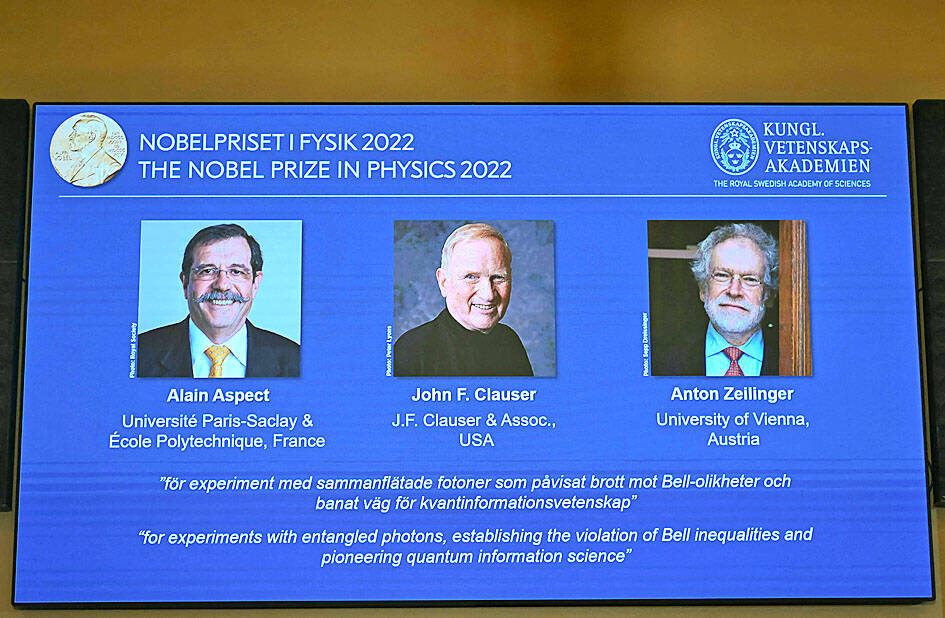Three scientists yesterday jointly won this year’s Nobel Prize in Physics for their work on quantum information science that has significant applications, for example in the field of encryption.
Alain Aspect of France, John Clauser of the US and Anton Zeilinger of Austria were cited by the Royal Swedish Academy of Sciences for discovering the way that particles known as photons can be linked, or “entangled,” with each other even when they are separated by large distances.
“Quantum information science is a vibrant and rapidly developing field,” Nobel Committee member Eva Olsson said. “It has broad and potential implications in areas such as secure information transfer, quantum computing and sensing technology.”

Photo: AFP
“Its origin can be traced to that of quantum mechanics,” she said. “Its predictions have opened doors to another world, and it has also shaken the very foundations of how we interpret measurements.”
Speaking by phone to a news conference after the announcement, Zeilinger said he was “still kind of shocked” at hearing he had received the award.
“But it’s a very positive shock,” said Zeilinger, 77, who is based at the University of Vienna.
Clauser, Aspect and Zeilinger have figured in Nobel speculation for more than a decade. In 2010, they won the Wolf Prize in Israel, seen as a possible precursor to the Nobel.
While physicists often tackle problems that appear at first glance to be far removed from everyday concerns — tiny particles and the vast mysteries of space and time — their research provides the foundations for many practical applications of science.
The Nobel Committee said Clauser, 79, developed quantum theories first put forward in the 1960s into to a practical experiment. Aspect, 75, was able to close a loophole in those theories, while Zeilinger demonstrated a phenomenon called quantum teleportation that effectively allows information to be transmitted over distances.
“Using entanglement you can transfer all the information which is carried by an object over to some other place where the object is, so to speak, reconstituted,” Zeilinger said, adding that this only works for tiny particles.
“It is not like in the Star Trek films [where one is] transporting something, certainly not the person, over some distance,” he said.
When he began his research, Zeilinger said the experiments were “completely philosophical without any possible use or application.”
Since then, the laureates’ work has been used to develop the fields of quantum computers, quantum networks and secure quantum encrypted communication.

EUROPEAN TARGETS: The planned Munich center would support TSMC’s European customers to design high-performance, energy-efficient chips, an executive said Taiwan Semiconductor Manufacturing Co (TSMC, 台積電), the world’s largest contract chipmaker, yesterday said that it plans to launch a new research-and-development (R&D) center in Munich, Germany, next quarter to assist customers with chip design. TSMC Europe president Paul de Bot made the announcement during a technology symposium in Amsterdam on Tuesday, the chipmaker said. The new Munich center would be the firm’s first chip designing center in Europe, it said. The chipmaker has set up a major R&D center at its base of operations in Hsinchu and plans to create a new one in the US to provide services for major US customers,

The Ministry of Transportation and Communications yesterday said that it would redesign the written portion of the driver’s license exam to make it more rigorous. “We hope that the exam can assess drivers’ understanding of traffic rules, particularly those who take the driver’s license test for the first time. In the past, drivers only needed to cram a book of test questions to pass the written exam,” Minister of Transportation and Communications Chen Shih-kai (陳世凱) told a news conference at the Taoyuan Motor Vehicle Office. “In the future, they would not be able to pass the test unless they study traffic regulations

GAINING STEAM: The scheme initially failed to gather much attention, with only 188 cards issued in its first year, but gained popularity amid the COVID-19 pandemic Applications for the Employment Gold Card have increased in the past few years, with the card having been issued to a total of 13,191 people from 101 countries since its introduction in 2018, the National Development Council (NDC) said yesterday. Those who have received the card have included celebrities, such as former NBA star Dwight Howard and Australian-South Korean cheerleader Dahye Lee, the NDC said. The four-in-one Employment Gold Card combines a work permit, resident visa, Alien Resident Certificate (ARC) and re-entry permit. It was first introduced in February 2018 through the Act Governing Recruitment and Employment of Foreign Professionals (外國專業人才延攬及雇用法),

‘A SURVIVAL QUESTION’: US officials have been urging the opposition KMT and TPP not to block defense spending, especially the special defense budget, an official said The US plans to ramp up weapons sales to Taiwan to a level exceeding US President Donald Trump’s first term as part of an effort to deter China as it intensifies military pressure on the nation, two US officials said on condition of anonymity. If US arms sales do accelerate, it could ease worries about the extent of Trump’s commitment to Taiwan. It would also add new friction to the tense US-China relationship. The officials said they expect US approvals for weapons sales to Taiwan over the next four years to surpass those in Trump’s first term, with one of them saying